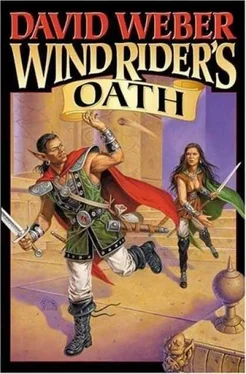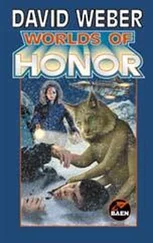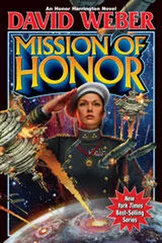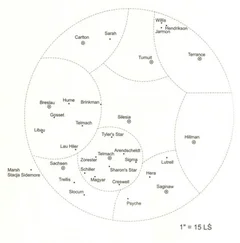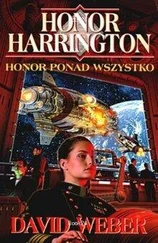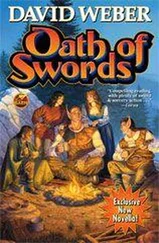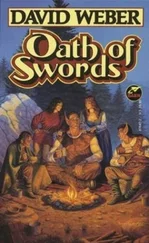A silence hovered between them. It was very quiet in the sun-filled, whitewashed room, but Kaeritha sensed the fury blazing incandescently within her host. Yet for all his prejudices, he was a disciplined man, and he kept that fiery temper securely leashed. For the most part.
"Milady Champion," he said at length, and despite his control, there was a bite in the way he pronounced "champion" which Kaeritha didn't care for at all, "I make all due allowance for the fact that our language is not your native tongue. As you yourself just pointed out. However, I, too, have copies of the original charter and grant-made at the same time, by the same scribe, as the documents you examined at Kalatha-in my library. I am quite prepared, if you so desire, to allow you to examine them, as well. I am also prepared to allow you to discuss-freely, and in private-my interpretation of them with my senior magistrate. Who is also my librarian and, I might point out, served my father before me, and whose interpretation is identical to my own. As I say, any fair reading not prejudiced by . . . differences of opinion as to proper ways of life, let us say, must come to the same conclusion."
Kaeritha's jaw clenched, and she was forced to throw a leash on to her own temper at the pointed emphasis of his final sentence. Yet even through her anger, she felt a fresh sense of puzzlement. As she'd told him, she was at least as thoroughly trained in matters of law as most royal and imperial judges in the King Emperor's service. To be sure, she was more familiar with Axeman law than that of other countries, but the Code of Kormak was the basic foundation of all Norfressan law, not just the Empire's. And there was no way in the world that anyone could possibly stretch and strain the language of the documents in question to support Trisu's unvarnished contention. Yet she'd already come to the conclusion that he was an intelligent man, despite his prejudices. He must know the language wouldn't support his position . . . so why was he offering-indeed, almost demanding-that she examine them?
She made herself sit very still and draw a deep, tension-cleansing breath. Trisu's anger was resonating with her own, threatening to undermine the impartiality any champion of Tomanâk must maintain when called upon to consider matters of justice. She knew that, and so she knew she must proceed carefully and cautiously. Besides, she reminded herself as she felt the white-hot heat of her own initial anger cool ever so slightly, he had a point. She'd examined Kalatha's documents; she had a moral obligation to examine his, as well, and to listen to his magistrate's construction of the language involved. The chance that she'd misunderstood or misinterpreted the originals was minuscule, but it did exist, and it was her responsibility to be absolutely positive she had not.
"Milord," she said finally, keeping her voice very level, "you've assured me that your own opinions-or prejudices-are not the basis for your disagreements with Kalatha and the war maids. I, in turn, assure you , that any 'differences of opinion' I may hold have not been and will not be permitted to influence my reading of the law or of the evidentiary documents. I will examine them again, if you so desire. And I will discuss them with your magistrate. In the end, however, my interpretation of them will be based upon my reading of them, not yours. And if I come to the conclusion that they support my original belief that Mayor Yalith's reading of them is correct, then I will so rule as champion of Tomanâk."
Trisu's gray eyes glittered. There was anger in them, but not nearly so much as she'd expected. Indeed, that hard light seemed born of confidence, not temper. Which only increased her sense of confusion.
If she ruled formally in this case as Tomanâk's champion, her decision was final. That was one reason champions so seldom made formal rulings. Most of them, like Kaeritha herself, preferred simply to investigate and then to make recommendations to the appropriate local authorities. It prevented bruised feelings, and it allowed for local compromises, which any champion knew were often a truer path to justice than cold, unparsed legalism. Yet Trisu seemed unfazed by the possibility of an adverse decision which would absolutely and permanently foreclose any revisiting of the dispute. Indeed, he seemed to welcome the possibility of a ruling from her, and she wondered if he had deliberately set out to goad her into exactly this course of action.
"The ruling of Scale Balancer's champion must, of course, be final," he said at length. "And, to be honest, Milady Champion, even if you should rule against me, simply having the entire matter laid to rest once and for all will be a relief of sorts. Not that I believe you will."
"We'll see, Milord," Kaeritha said. "We'll see."
"Here it is, Dame Kaeritha."
Salthan Pickaxe was some sort of distant cousin of Trisu, although he was at least twice Trisu's age. That kind of relationship between a lord and his chief magistrate was scarcely unheard of, but Kaeritha had been more than a bit surprised by Salthan. He was much more like Sir Altharn then his liege, with a lively sense of humor hiding behind bright blue-gray eyes and a thick, neatly trimmed beard of white-shot auburn. He was also, she'd been amused to note, much more gallant then his cousin. Indeed, he seemed quite taken by the combination of Kaeritha's dark black hair and sapphire eyes. Which, to be fair, was such an unusual combination among Sothōii that she'd become accustomed to their reaction to her exotic attractiveness.
But Salthan was also at least as intelligent as Trisu, and he seemed just as mystifyingly confident.
Now he took a heavy wooden scroll case from its pigeonhole and eased its contents out into his hand. He was obviously well accustomed to dealing with documents which were no longer in their first youth, but it was unhappily apparent that not all keepers of Lorham's records had been. Kalatha's documents were, by and large, in much better shape than Lorham's, and it showed in the care Salthan took as he slowly and gently unrolled the scroll.
Age-fragile parchment crackled, and Kaeritha felt a tingle of that unease any archivist feels when her examination of ancient materials threatens them with destruction. But Salthan got it open without inflicting major additional damage. He laid it out on the library table, then adjusted the oil lamp's wick and chimney to provide her with the best possible light.
It was as well he had, Kaeritha thought, leaning forward and squinting at the document before her. It was, as Trisu had said, a duplicate copy of Lord Kellos' original grant to the war maids, and it was even more faded and difficult to read than the original. No doubt because of the indifferent care it had received, she thought. Still, she could make out the large numeral "3" in the margin, which indicated that it was the third copy made, and she recognized the crabbed, archaic penmanship of the same scribe who'd written out the original.
She ran her eyes down the section which set forth the boundaries of the grant, looking for the language which defined the specific landmarks around the river and the disputed gristmill. It was the least ambiguous and archaic of the entire document, and she might as well start with the parts that were easiest to follow. Besides, the exact boundaries were at the heart of the issue, so-
Ah! Here they were. She bent closer, reading carefully, then stiffened.
That can't be right , she thought, and reread the section. The words remained stubbornly unchanged, and she frowned in puzzlement. Then she opened the document pouch she'd brought with her and extracted the notes she'd written out so meticulously in Kalatha's library. She opened them and laid the neatly written pages on the table beside the scroll, comparing the passage she'd copied with the document before her on a word-for-word basis. It was absolutely clear and unambiguous.
Читать дальше
